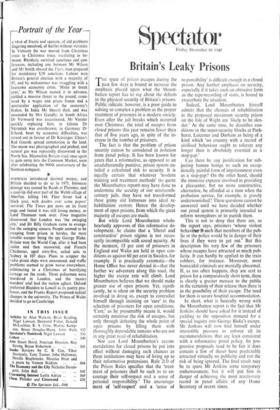Britain's Leaky Prisons
rr HE spate of prison escapes during the 1 past few days is bound to increase the emphasis placed upon what the Mount- batten report has to say about the defects in the physical security of Britain's prisons. Public ridicule, however, is a poor guide to solving so complex a problem as the proper treatment of prisoners in a modern society. Even after the jail breaks which occurred over Christmas, the total of escapes from closed prisons this year remains fewer than that of five years ago, in spite of the in- crease in the number of prisoners.
The fact is that the problem of prison security cannot be considered in isolation from penal policy. It has been known for years that a reformative, as opposed to an unadulteratedly punitive, prison system en- tailed a calculated risk to security. It is equally certain that whatever 'modern training and treatment methods' (to quote the Mountbatten report) may have done to undermine the security of our nineteenth- century jails, they have not transformed these grimy old fortresses into ideal re- habilitation centres. Hence the develop- ment of open prisons, from which the great majority of escapes are made.
But while Lord Mountbatten whole- heartedly approves of this reformative de- velopment, he claims that a 'liberal and constructive' prison regime is not neces- sarily incompatible with sound security. At the moment, 15 per cent of prisoners in England and Wales are held in open con- ditions as against 60 per cent in Sweden, for example. It is practically axiomatic—the Home Office has never denied it—that the further we adventure along this road, the higher the escape rate will climb. Lord Mountbatten believes that we should make greater use of open prisons. Yet, signifi- cantly, he is silent on the security problem involved in doing so, except to contradict himself through insisting on 'care' in the selection of prisoners for open conditions. 'Care,' as he presumably means it, would certainly minimise the risk of escapes, but only through defeating the whole point of open prisons by filling them with thoroughly dependable inmates who are not in any great need of rehabilitation.
Nor can Lord Mountbatten's recom- mendations for closed prisons be put into effect without damaging such chances as these institutions may have of living up to their reformative pretensions. Rule 2(3) of the Prison Rules specifies that the 'treat- ment of prisoners shall be such as to en- courage their self-respect and a sense of personal responsibility.' The encourage- ment of 'self-respect' and a 'sense of responsibility' is difficult enough in a closed prison. Any further emphasis on security, especially if it takes such an obtrusive form as the tape-recording of visits, is bound to exacerbate the situation.
Indeed, Lord Mountbatten himself admits that the chances of rehabilitation in the proposed maximum security prison on the Isle of Wight are 'likely to be slen- der.' At the same time, he describes con- ditions in the super-security blocks at Park- hurst, Leicester and Durham as being of a kind which 'no country with a record of civilised behaviour ought to tolerate any longer than is absolutely essential as a stop-gap.'
Can there be any justification for sub- jecting human beings to such an excep- tionally painful. form of imprisonment even as a stop-gap? On the other hand, should the immense expense involved in providing a pleasanter, but no more constructive, alternative, be afforded at a time when the probation service, for example, is grossly undernourished? These questions cannot be answered until we have decided whether our penal system is primarily intended to reform wrongdoers or to punish them.
This is not to deny that there are, as the report says, prisoners 'whose violent behavi 14 such that members of the pub- lic or the police would be in danger of their lives if they were to get out.' But this description fits very few of the prisoners whose escapes have attracted so much pub- licity. It can hardly be applied to the train robbers, for instance. Moreover, most homicidal criminals are mentally abnormal. If, as too often happens, they are sent to prison for a comparatively short term, there is clearly a greater menace to the public in the certainty of their release than there is in the possibility of their escape. The need for them is secure hospital accommodation.
In short, what is basically wrong with the Mountbatten report is the fact that Mr Jenkins should have asked for it instead of yielding to the opposition demand for a special inquiry into George Blake's escape. Mr Jenkins will now find himself under irresistible pressure to enforce all its recommendations that are least consistent with a reformative penal policy. Its pro- gressive proposals (and to be fair it does contain a few of these) have predictably attracted virtually no publicity and run the risk of being ignored. The final result may be to spare Mr Jenkins some temporary embarrassment, but it will put him in danger of achieving the most reactionary record in penal affairs of any Home Secretary of recent times.






































 Previous page
Previous page